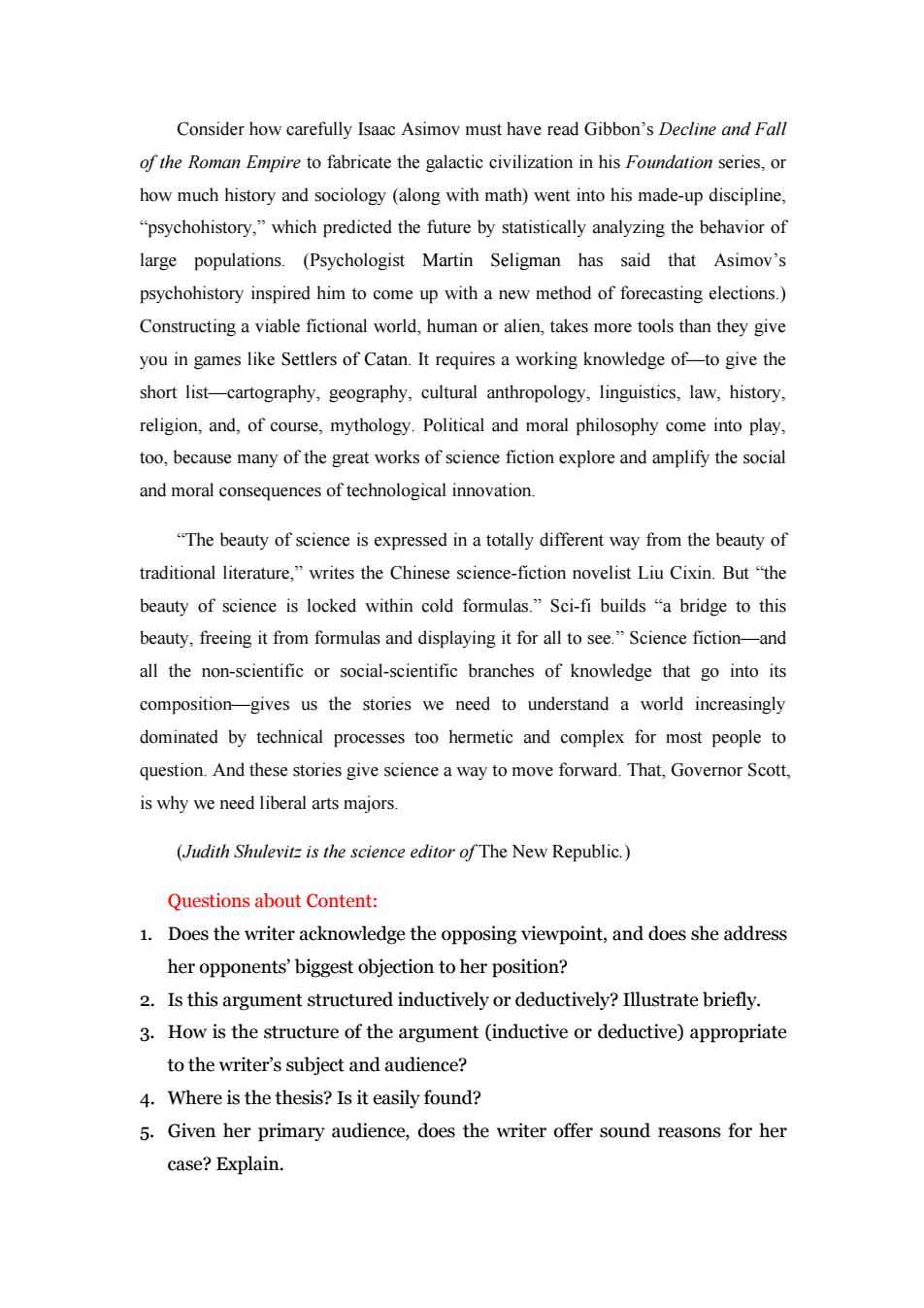正在加载图片...

Consider how carefully Isaac Asimov must have read Gibbon's Decline and Fall of the Roman Empire to fabricate the galactic civilization in his Foundation series,or how much history and sociology (along with math)went into his made-up discipline, "psychohistory,"which predicted the future by statistically analyzing the behavior of large populations.(Psychologist Martin Seligman has said that Asimov's psychohistory inspired him to come up with a new method of forecasting elections.) Constructing a viable fictional world,human or alien,takes more tools than they give you in games like Settlers of Catan.It requires a working knowledge ofto give the short list-cartography,geography,cultural anthropology,linguistics,law,history, religion,and,of course,mythology.Political and moral philosophy come into play, too,because many of the great works of science fiction explore and amplify the social and moral consequences of technological innovation. "The beauty of science is expressed in a totally different way from the beauty of traditional literature,"writes the Chinese science-fiction novelist Liu Cixin.But "the beauty of science is locked within cold formulas."Sci-fi builds "a bridge to this beauty,freeing it from formulas and displaying it for all to see."Science fiction-and all the non-scientific or social-scientific branches of knowledge that go into its composition-gives us the stories we need to understand a world increasingly dominated by technical processes too hermetic and complex for most people to question.And these stories give science a way to move forward.That,Governor Scott, is why we need liberal arts majors. (Judith Shulevitz is the science editor ofThe New Republic.) Questions about Content: 1.Does the writer acknowledge the opposing viewpoint,and does she address her opponents'biggest objection to her position? 2.Is this argument structured inductively or deductively?Illustrate briefly. 3.How is the structure of the argument (inductive or deductive)appropriate to the writer's subject and audience? 4.Where is the thesis?Is it easily found? 5.Given her primary audience,does the writer offer sound reasons for her case?Explain.Consider how carefully Isaac Asimov must have read Gibbon’s Decline and Fall of the Roman Empire to fabricate the galactic civilization in his Foundation series, or how much history and sociology (along with math) went into his made-up discipline, “psychohistory,” which predicted the future by statistically analyzing the behavior of large populations. (Psychologist Martin Seligman has said that Asimov’s psychohistory inspired him to come up with a new method of forecasting elections.) Constructing a viable fictional world, human or alien, takes more tools than they give you in games like Settlers of Catan. It requires a working knowledge of—to give the short list—cartography, geography, cultural anthropology, linguistics, law, history, religion, and, of course, mythology. Political and moral philosophy come into play, too, because many of the great works of science fiction explore and amplify the social and moral consequences of technological innovation. “The beauty of science is expressed in a totally different way from the beauty of traditional literature,” writes the Chinese science-fiction novelist Liu Cixin. But “the beauty of science is locked within cold formulas.” Sci-fi builds “a bridge to this beauty, freeing it from formulas and displaying it for all to see.” Science fiction—and all the non-scientific or social-scientific branches of knowledge that go into its composition—gives us the stories we need to understand a world increasingly dominated by technical processes too hermetic and complex for most people to question. And these stories give science a way to move forward. That, Governor Scott, is why we need liberal arts majors. (Judith Shulevitz is the science editor of The New Republic.) Questions about Content: 1. Does the writer acknowledge the opposing viewpoint, and does she address her opponents’ biggest objection to her position? 2. Is this argument structured inductively or deductively? Illustrate briefly. 3. How is the structure of the argument (inductive or deductive) appropriate to the writer’s subject and audience? 4. Where is the thesis? Is it easily found? 5. Given her primary audience, does the writer offer sound reasons for her case? Explain